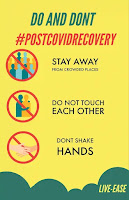As with increase in cases of COVID-19 day by day, there are recovering cases too increasing with a good proportion. These recovering cases’ patients are frighten off, of another type of danger of getting back the COVID-19 infection or could suffer from mucormycosis that is the black fungal disease.
Basically the mild cases of COVID-19 get
recovered in 2 weeks.
While the severe or most serious cases of
COVID-19 get recovered in 1 month.
The major part of recovery lay in the diet
that the patient takes in everyday life. The COVID-19 virus infection triggers
for more types of diseases by weakening the immune system of body and also
decreases the strength of body so as to fight against the diseases.
Therefore, to strengthen immune and build
up energy again in the body one should look after their diet plan and also the
type of living they are in.
In order to be safe from both the
infections, one must follow several guidelines which include both the doings
and avoiding.
Dos for recovery:
1.
Rest
The body should get complete
rest for about 1 week to recover from the infection. As sleep and rest
speeds up the recovery rate and hence the physicians prescribes for rest as
much as possible.
2.
Exercise
Moving and maintaining an
active routine for better blood and oxygen circulation in body is necessary.
Exercising may sound unappealing, but 10 minutes per day movement of body
detoxifies it and produces several hormones that help in recovering faster.
Mild exercises which the
patient likes could be done.
3.
Entertainment
After continuously
remaining in an isolated and stressed environment there is a need for
entertainment so as to maintain hormones in normal state. Prefer to watch
comedy shows and manage to be happy most of the time and spending time
with the loved ones.
4. Brain games
One should prefer to play brain games like sudoku, as it is found that COVID can do
damages to neural cells too.
5.
Diet
The most major role
performed in recovery is through the intake of components in diet. The
medications and multivitamins do their work better and wide, but the diet plan
is very important.
Have a diet rich in
proteins, high calories, fibers, vitamin-C & D.
Have at least 75 to 100
grams of protein per day in diet.
2 cups of fresh fruits should be added in diet daily which can include:
Orange, kiwi,
strawberries, guava, papaya, apple.
Also the fruits rich in Vitamin-C
should be kept in high priority.
2.5 cups of veggies per
day are necessary. These can include:
Green veggies, carrot,
tomato, radish.
The diet should be taken
in small portions for easy digestion.
6.
Unsaturated fatty acids
In terms of fats and oils
in diet, go for the unsaturated fatty acids.
The unsaturated fatty
acids are present in nut oil, olive oil, corn oil, soy oil and sunflower oil.
7. Dense calorie foods
As the drained body needs to be energized and hence, calories provide instant energy.
These may include:
Starchy foods or vegetables, whole grain cereals like lentils, oats, millets,
rice, etc.
8.
Oxygen saturation level
Keep on monitoring the oxygen
saturation level of blood & the blood pressure as well.
9.
Hydration
Drink up to 8-10
glasses of water daily. It is very necessary to keep body hydrated.
10.
Extra Immune Builders
The herbs are loaded with
several antioxidants, which build up the immune system fast and at better rate,
thus should be consumed in the form of decoction (kadha), turmeric milk,
green tea, lemon tea, ginger tea, etc.
Bonus tips..
11.
Get yourself vaccinated
after 1 to 1.5 months.
12.
Use steroids only in
required amounts.
13.
Prefer to be masked when
outside.
Don’ts for recovery:
1.
Avoid too much work, stress
or spending time alone.
As anxiety and tension
might cause severe damage to mental as well as to physical health.
2. Avoid empty calories
Empty calories refer to
those types of calories present in foods which don’t posses any nutritional
value. Like the junk food.
3.
Restrict too much caffeine
Do not intake too much
caffeine or caffeinated drinks.
4.
Avoid taking saturated fats
in diet.
Foods such as fatty
meat, processed meat, butter, cheese, ghee and cream contain saturated
fats.
5.
Avoid having Trans fat too
As it may also cause harm and could be heavy
on body digestion.
The Trans fat is present
in fast foods, deep fried snacks, bakery items and cookies.
6.
Limit out the salt and sugar intake.
Prefer to have salt less
than 5gms per day and that too iodized.
Bonus…
7.
Avoid high sodium contents in diet.
8.
Restricted intake of
carbonated beverages, fruit juices, syrups or
anything that constitute artificially sweetened contents.
9.
Avoid any type of work related to soil or gardening.
In addition to all above listed guidelines one should have full
faith and desire to get well soon. He should tell himself that yes I’ll be
fine and OK after some time.
At the moment when taking medicines should confirm yourself that
those medicines are going to help your body to fight against all viruses.
This is because when one has faith in one self and he wants to be
well soon than all medicines and diet and habits work in his favor. Also gives
him and his body to fight against all obstacles and diseases as well.
Be secured. Be safe. Be
well. Be happy. Be at home.

